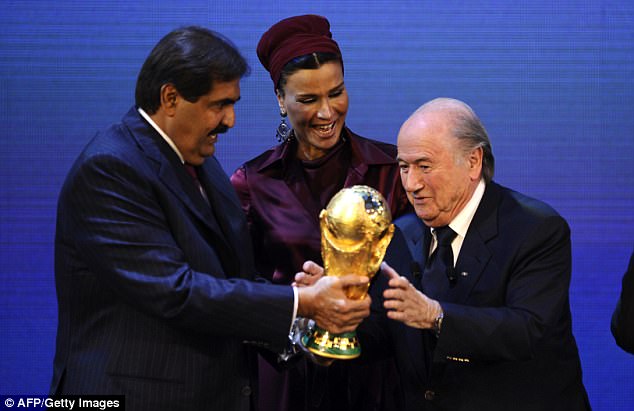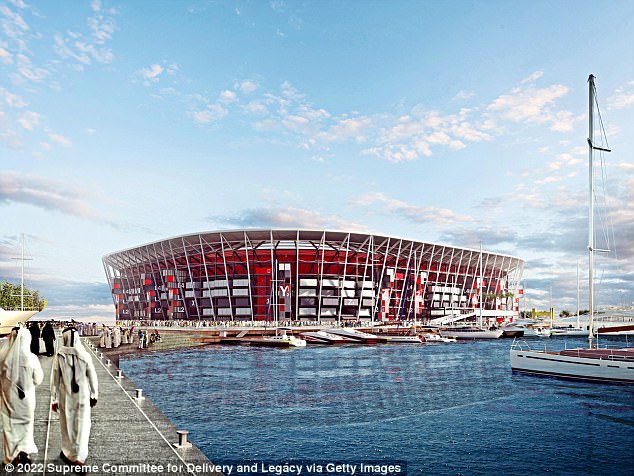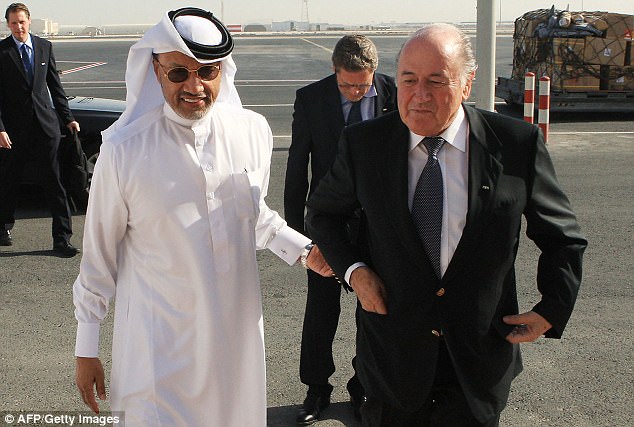This material belongs to: The Mail on Sunday.
- Qatar’s state TV company agreed to pay FIFA £100m if they got 2022 World Cup
- Ex-FIFA president Sepp Blatter knew Qatar would beat favourites USA in vote
- But after Qatar won, Blatter twice tried to retract their right to host the event
- On both occasions he agreed to drop his complaints if Mohamed bin Hammam would allow him to run unopposed in the 2011 FIFA presidency election
The storm of controversy over the award of the 2018 and 2022 World Cups to Russia and Qatar is reignited, more than seven years after the votes, with the revelation that Qatar’s state TV company agreed a $100million payment to FIFA if they got the 2022 finals.
The claims are made in a new book by a whistleblower from inside Australia’s failed 2022 bid, Bonita Mersiades, who has spent years investigating the saga and conducted a recent confessional interview with former FIFA president Sepp Blatter about the process.
Among other new revelations, Blatter claims in the book that:
- German legend Franz Beckenbauer, who publicly supported Australia’s bid, would not have done so unless he was paid — in breach of the rules;
- Blatter knew before the vote for 2022 was even conducted that Qatar would win and favourites USA would lose out;
- He was so certain of it that he personally called American president Barack Obama in the days before the vote to tell him the US would lose.

Blatter says he knew Qatar would win because Michel Platini told him that he and multiple others on the 22-man voting ExCo panel were going to back the tiny state on the Arabian Peninsula. Blatter was subsequently dismayed with Qatar’s win and wanted them stripped of the tournament but says he did a deal — twice — to stop that happening, in exchange for Qatar’s Emir guarantee that Blatter would not face a 2011 FIFA presidential challenge from Qatar’s ExCo member Mohamed bin Hammam.
Blatter also describes the circumstances of the deals, one made in Doha in late 2010 and one in his FIFA office in Zurich in 2011.
The book says that in the months before the vote in December 2010 — with FIFA executives privately worried that a Qatar win would leave a financial shortfall for coffers in 2022 — broadcaster Al Jazeera (now beIN Sports) agreed the secret deal to pay $100m if Qatar won the vote, which subsequently happened. When asked about the payment by The Mail on Sunday this week, the broadcaster did not dispute it but characterised the bonus as ‘production contributions’ that are ‘standard market practice and are often imposed upon broadcasters by sports federations and sports rights holders’.
Beckenbauer, 72, is arguably Germany’s foremost footballing hero having won the World Cup for his country as a player and captain (1974), manager (1990) and tournament bid leader (2006).
In the book, Blatter is reported as claiming Beckenbauer would have received money for working for Australia’s bid team, a huge conflict of interest and forbidden by bidding rules given that he was on the 22-man ExCo voting committee. Beckenbauer was banned by FIFA for 90 days in 2014 for failing to cooperate with lawyer Michael Garcia‘s inquiry into the 2018-2022 process, and when he did later cooperate, he gave evidence that Garcia concluded was unreliable and contradicted other evidence.
Separately, Beckenbauer has been subject to an ongoing investigation around alleged bidding irregularities around the 2006 World Cup.
Mersiades explains how Australia’s three ‘international bid consultants’ were paid around £9m out of a public purse budget of around £30m for services that remain sketchy. One of those consultants was Beckenbauer’s friend and business partner, Fedor Radmann, who also declined to cooperate with Garcia. Radmann earned about £2m from Australia.
Blatter told Mersiades: ‘No doubt Radmann had some scheme going. I know he [Radmann] got a lot of money, and Franz wouldn’t do what he did for Australia for nothing.’
Blatter claims that in the end, Australia’s sole vote before they crashed out actually came from him, not Beckenbauer, who has always declined to say who he voted for. Beckenbauer has not responded to questions about the issue submitted to him via his representatives.
Garcia said in his report: ‘Devices employed by the bid team and its consultants were seemingly aimed at hiding ties with Mr Radmann, while taking advantage of his influence over Mr Beckenbauer to further the bid strategy.’
The deal over the $100m bonus from Al Jazeera was agreed, the book says, with the involvement and knowledge of Jérôme Valcke, secretary general of FIFA at the time but later banned for nine years from football for corruption.
The book says: ‘Valcke’s concerns about revenue growth in relation to Qatar were assuaged when negotiations commenced in October 2010 for a bonus payment of US $100m to FIFA from Al Jazeera if Qatar won 2022. There was no way he could turn it down. According to former FIFA staff, Valcke’s share was generally five per cent for negotiating the deal.’
Mersiades asked Blatter about this bonus and he says: ‘Sponsors and broadcasters pay bonuses all the time. That is not unusual.’
When pushed to clarify that a $100m bonus was ‘normal’, Blatter shrugged.
A spokesman for beIN said: ‘There is clearly a significant uplift in interest and additional revenues to a broadcaster and significant additional local production costs to a rights holder when a major sports event is awarded in a broadcaster’s domestic market. The relevant media agreements were stand alone from any bid, and were in no way intended to influence the outcome of the vote.’
The book will be launched at a reception at the Houses of Parliament on Wednesday, hosted by football governance reform advocates including MP Damian Collins.



